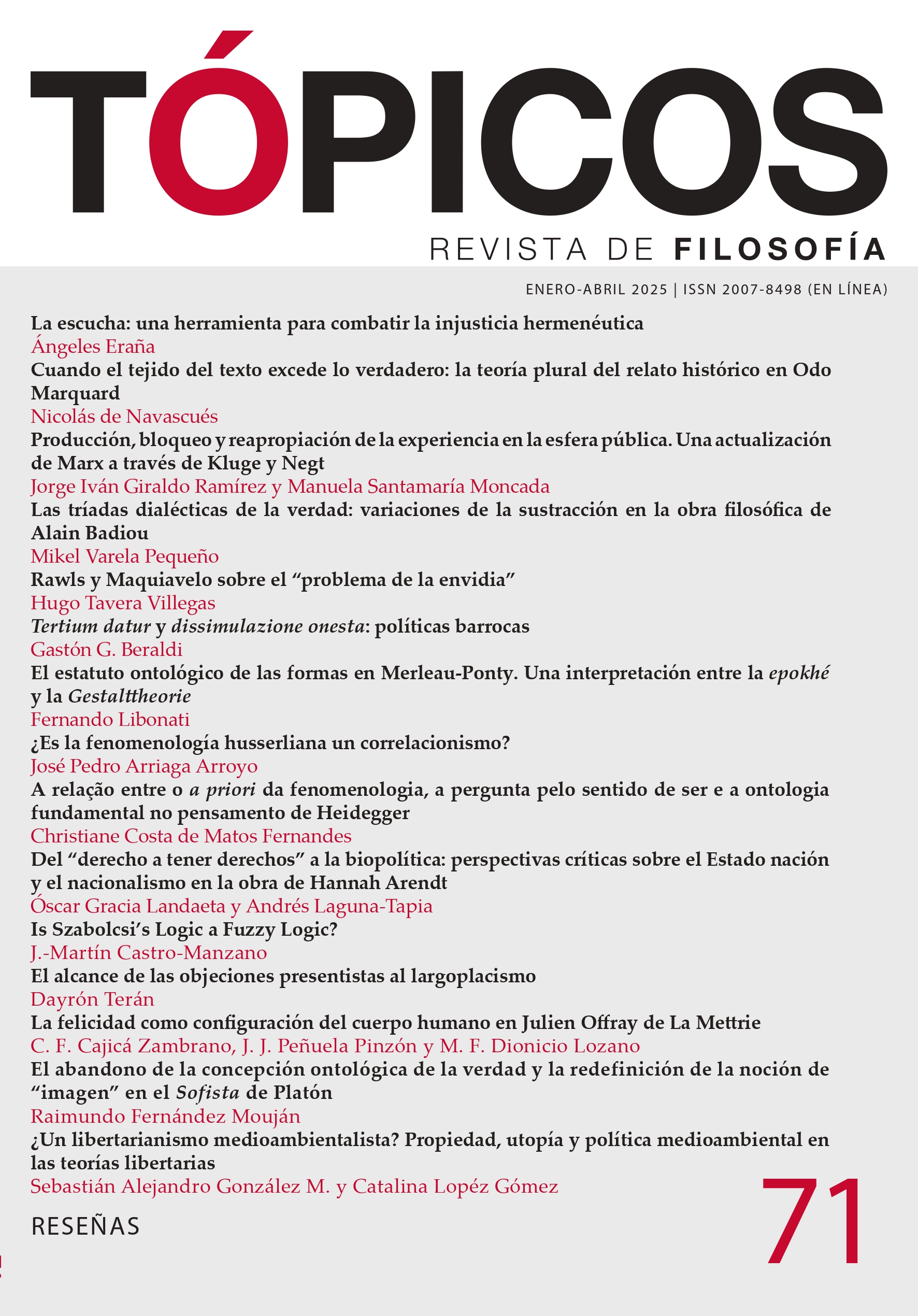Publicado 2024-12-16
Palabras clave
- Gestalt,
- Isomorfismo,
- Epokhé,
- Dialéctica,
- Naturalización de la fenomenología
Derechos de autor 2024 Tópicos, Revista de Filosofía

Esta obra está bajo una licencia internacional Creative Commons Atribución-NoComercial-SinDerivadas 4.0.
Cómo citar
Resumen
Este artículo reconstruye la definición de “forma” ofrecida en La estructura del comportamiento. Luego se evalúan dos interpretaciones posibles: una realista y otra denominada “idealista”. Se sostiene que la primera no logra explicar la originalidad de los distintos tipos de formas y, en consecuencia, tampoco su carácter noemático (ser para una conciencia), mientras que la segunda resulta incompatible con el carácter descriptivo (no antropomórfico) de las Gestalten y conduce a una concepción de la naturaleza que resulta problemática respecto de la posición merleau-pontyana. Se propone una tercera interpretación: el concepto de “dialéctica”, tal como es utilizado por Merleau-Ponty para definir los órdenes físico, vital y humano, justifica una ampliación de los conceptos de “naturaleza” y de “conciencia” que permite conjugar el carácter descriptivo y noemático. Con base en ello, se concluye que las formas pueden ser identificadas con el proceso de fenomenalización de la naturaleza.
Descargas
Referencias
- Bannan, J. (1967). The Philosophy of Merleau-Ponty. Harcourt, Brace & World.
- Barbaras, R. (2005). A Phenomenology of Life. En T. Carman y M. Hensen (eds.), The Cambridge Companion to Merleau-Ponty. (pp. 206-230). Cambridge University Press.
- Dillon, M. (1988). Merleau-Ponty’s Ontology. Indiana University Press.
- Embree, L. (2008). El examen de la psicología de la forma de Merleau-Ponty. L. R. Rabanaque (trad.). Investigaciones Fenomenológicas: Anuario de la Sociedad Española de Fenomenología, 1, 73-107. DOI: https://doi.org/10.5944/rif.1.2008.5558.
- Foultier, A. P. (2015). Incarnated Meaning and the Notion of Gestalt in Merleau-Ponty’s Phenomenology. Chiasmi International, 17, 53-75. DOI: https://doi.org/10.5840/chiasmi20151710.
- Geraets, T. (1971). Vers une nouvelle philosophie transcendantale. Martinus Nijhoff.
- Koffka, K. (1969). Principios de psicología de la forma. Paidós.
- Köhler, W. (1947). Gestalt Psychology. Liveright.
- Köhler, W. (1948). Psicología de la Forma. R. V. Tortarolo (trad.). Argonauta.
- Larison, M. (2018). Tan lejos y tan cerca: Merleau-Ponty, entre forma y estructura. Acta Structuralica: International Jounral for Structuralist Research, special issue 2, 27-46. URL: https://acta.structuralica.org/pub-140727.
- Madison, G. B. (1981). The Phenomenology of Merleau-Ponty: A Search for the Limits of Consciousness. Ohio University Press.
- Merleau-Ponty, M. (1953). La estructura del comportamiento. E. Alonso (trad.). Hachette.
- Merleau-Ponty, M. (1993). Fenomenología de la percepción. J. Cabanes (trad.). Planeta-Agostini.
- Merleau-Ponty, M. (1995). La nature. Notes. Cours du Collège de France. Éditions du Seuil.
- Merleau-Ponty, M. (1996). Le primat de la perception et ses conséquences philosophiques. J. Prunair (ed.). Verdier.
- Merleau-Ponty, M. (2003). Nature. Course Notes from the Collège de France. R. Vallier (trad.). Northwestern University Press.
- Merleau-Ponty, M. (2010). Lo visible y lo invisible. E. Consigli y B. Capdevielle (trads.). Nueva Visión.
- Moinat, F. (2012). Le vivant et sa naturalisation. Le problème du naturalisme en biologie chez Husserl et le jeune Merleau-Ponty. Springer. DOI: https://doi.org/10.1007/978-94-007-1814-2.
- Núñez de Cáceres González, B. C. (2008). La definición fenomenológica de la forma en la filosofía de la percepción de Maurice Merleau-Ponty. [Tesis de Licenciatura, Universidad de Guanajuato]. Repositorio Institucional de la Universidad de Guanajuato. URL: http://repositorio.ugto.mx/handle/20.500.12059/5241.
- Peñaranda, M. L. (2007). Gurwitsch, Goldstein, Merleau-Ponty. Análisis de una estrecha relación. Contrastes. Revista Internacional de Filosofía, 12, 189-215.
- Roy, J.-M., Petitot, J., Pachoud, B. y Varela, F. J. (1999). Beyond the Gap: An Introduction to Naturalizing Phenomenology. En J. Petitot, F. J. Varela, B. Pachoud y J.-M. Roy (eds.), Naturalizing Phenomenology: Issues in Contemporary Phenomenology and Cognitive Sciences. (pp. 1-80). Stanford University Press.
- Sheredos, B. (2017). Merleau-Ponty’s Immanent Critique of Gestalt Theory. Human Studies, 40(2), 191-215. DOI: https://doi.org/10.1007/s10746-017-9420-1.
- Taminiaux, J. (1980). Merleau-Ponty: From Dialectic to Hyperdialectic. Research in Phenomenology, 10(1), 58-76.
- Thompson, E. (2007). Mind in Life: Biology, Phenomenology, and the Sciences of Mind. Harvard University Press.
- Vallier, R. (2003). Translator’s Introduction. En M. Merleau-Ponty, Nature. Course Notes from the College de France. (pp. xiii-xx). Northwestern University Press.
- Walton, R. (1993). El fenómeno y sus configuraciones. Almagesto.
- Wertheimer, M. (2012). On Perceived Motion and Figural Organization. L. Spillmann (ed.). MIT Press.





